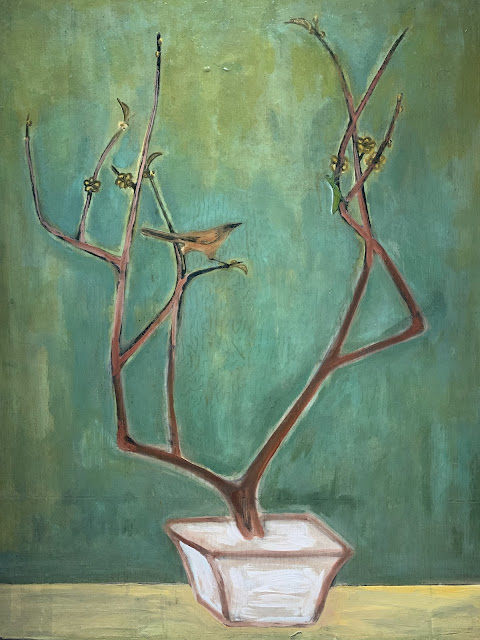Five generations later, nobody in the family knew about it. It wasn't some diaphanous secret, whispered in the old language that none of the kids spoke, banished over the years to successive coffins. It was considered so trivial a thing that it was unworthy of secrecy; it wasn't discussed at all.
Stories don't die if somebody, in some language, tells them. In a twisted form perhaps, I would have heard about it. Or something like it. Instead I had to learn it from an old xerox of typed yellow pages, scanned and uploaded to the Zoryan Institute website. So I suppose stories don't ever necessarily die. The possibility of resurrection is eternal.
Movses, a canny businessman from a family made rich by silkworms, sat in some filthy Turkish government outpost in Hamah and was handed a choice: your family becomes Muslim, or they're deported further south to Jerusalem. He and his wife were in their mid-fifties and might not have survived the trip. His youngest childen were growing weaker. His young cousins, named after the fox, had already lost their mother, grandparents and sister to typhus in the death camps, their father presumed dead after being dragged off to some labor brigade (he was).
He truly believed in the Christian faith, and he had scruples of sort. He might have refused the officials and taken his family's chances on the death march. But he was also rich, and that gave him a third choice: he converted, and then bribed the official to lose the paper.
I don't really care about religion, so a lie like that means nothing to me -- one god is as fake as another as far as I'm concerned -- but it would have meant the world to him.
At least one other wealthy family took Muslim names because they thought it would help them in business. The town pastor refused the "offer", was sent to Jerusalem, and survived. As far as I know, Movses took no names and may not have told any family members. If he did, they never spoke of it. For his trouble, he'd lose his youngest son anyway.
I only learned of it because those two fox cousins survived and one of them told the story to the Zoryan Institute.
So what? Well, a few days ago, a friend posted about an old story, a parable about a bird and a wise man. I think it might have been Biblical; it's certainly religion-scented. He has faith, I don't, but that's cool.
He wrote about how he told this story to his children: a man holds a small bird in his hands and approaches a wise man. To trick the sage, he intends to ask if the bird is alive or dead. The bird is moving and singing; it is clearly alive. If they wise man says so, the trickster will kill the bird. If he says it's dead, however, he'll set it free.
In the story, the sage tells the man "the bird is in your hands." The man asks again if said bird is alive or dead. "The answer is in your hands," the sage replies.
We're supposed to learn from this that our fate is in our own hands, so we should make good choices. His daughter, however, answered that she'd say the bird was dead. Why? Because, she explained, the objective isn't to be right, it's to save the bird. The power -- the ability to make a choice -- remains with the wise man until he decides to abrogate it and ask the trickster to make good choices.
This is the sort of online story that some would insist never happened, along the lines of three-year-olds who spout implausible wisdom. Like the mom who claimed her kid said "everyone dies, but not words." I know them, though, and I think it did happen. Honestly, I don't care if it didn't. It's not the point.
So, okay, the objective isn't to be right, it's to save the bird. And that's within the wise man's power until he relinquishes it, unless the trickster grows impatient and kills the bird out of boredom, misplaced rage, or a need to assert dominance. The man with the bird is clearly a bad person. Can we even trust him to release the bird if we lie?
Movses chose to lie, and his youngest son died of typhus in a death camp in Hamah.
For the longest time, I struggled to reconcile another, modern-day lie with the world I know: that so many people who so clearly support a free and sovereign Taiwan won't take the next logical step and call it a country. In Taiwan, they won't amend the constitution, they won't change the "Republic of China" name. It's a lie, and it can read as undermining the cause.
Insist that Taiwan is sovereign and has never been part of the 'China' that everyone understands to be China, change the name, change the constitution, be right or die trying -- and maybe you get a war.
Tell the Chinese government that the bird's fate is in their hands, and you've condemned yourself anyway. You can't trust someone to make good choices as they try to trick the world into either lying, or destroying Taiwan. They're already not making good choices, and they have no motivation to be better people. You may as well condemn Taiwan to die.
Put off the answer, implying that maybe, just maybe, the lie is acceptable -- the Republic of China isn't the dead name of an ideology and national concept that's little more than a coma patient on life support -- and you might not save the bird, but you retain some of the power and some chance that perhaps it will fly off to some uncapturable state.
Let's play Bad Pastor -- no, not like that, gross dude -- I mean like clunky metaphors and a bored congregation. Let's make the metaphor plain:
The US is the self-righteous sage who thinks telling a trickster to make good choices might actually cause them to rethink their path and consider peace. It doesn't even matter who's in power, from Obama to President Rapist to Biden to President Rapist again for some goddamn reason. Not taking a position, committing only to a peaceful resolution of tensions between villain and bird, is telling the bird to watch its neck and not a lot more.
China, the bad guy, desperately wants someone to speak the truth. Saying aloud that the Republic of China is a lifeless shell with no future, but Taiwan is a sovereign and vibrant nation that is culturally and politically distinct from China gives them an excuse to try and kill it.
The KMT is trying to outright lie -- to say Taiwan is dead so that the ROC may live on as "part of China." Now that they're mostly run by bought-and-paid-for unificationists and overt CCP agents and traitors, they mean that literally as part of the People's Republic.
But tricksters can't be trusted; this will still be the death of Taiwan.
The rest of us are just trying to figure out exactly how much we can grease the system. Imply a lie without stating it outright. Keep a dead name, a government system and constitution that's got some ridiculous bits, and our lives for as long as we can. Placate the trickster until we can find a way out.
The objective, after all, is not to be right. It's to save the bird.
Perhaps it's not exactly the same as converting to a religion you don't believe in but rather than live a lie, bribe someone to lose a paper. It's not incomparable, though.
It might not work. China might grow irritable or scared enough at any moment and use Taiwan's willingness to imply a lie without confirming it as an excuse to crush its neck.
But between certain death, another kind of certain death, and asking bad people to be better than they are, it's just about the only path left.
Taiwan has something going for it, though: China doesn't seem to know what kind of bird it's threatening. It sees Taiwan as a little sparrow, easily captured and held, its bones easily snapped.
I think Taiwan is a Malayan night heron: hefty in history and culture and uniqueness, strong of bone, with a long, sharp beak and unwavering eyes. (Seriously, those birds will stare you down. They judge you. I swear night herons can see your soul.) They look like they can't fly, but they can.
I've never heard of a night heron messing up an attacker. They mostly seem to like to hang around and eat tasty things. But it doesn't look easy to kill one with your bare hands. As though if provoked, it would go straight for the face.










